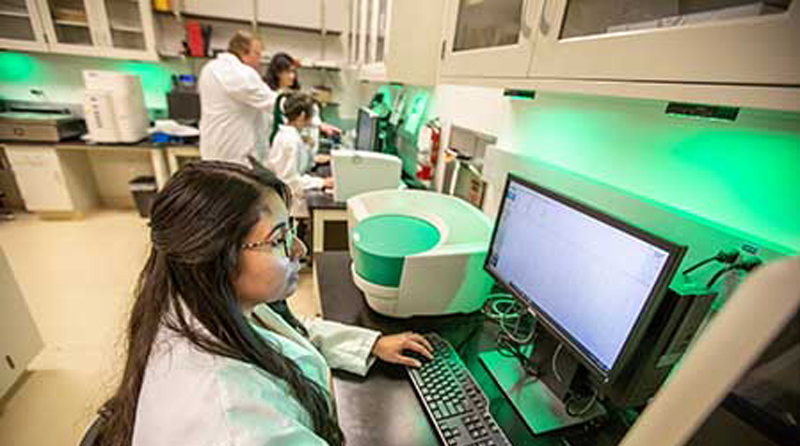Charlotte Researchers Created 150 Inventions In The Past Five Years
“UNC Charlotte has always had an entrepreneurial mindset,” said John Daniels, vice chancellor for the Division of Research. “It is part of our history and mission that we focus on addressing challenges and developing solutions to benefit our region, state and nation.”
In just the past five years, University researchers have created more than 150 new inventions and filed 200-plus patent applications resulting in 17 new spin-off companies from University research.
Despite Charlotte’s relative youth as an institution when compared with others of its size and scope, the Division of Research aims to fully leverage opportunities through the lens of innovation, Daniels explained.
“We want to provide the conditions for the core ideas of our students, faculty and staff to evolve, take shape and thrive,” Daniels stated.
Laura Peter, executive director of the UNC Charlotte Office of Research Commercialization and Partnerships, emphasized the importance of both protection and promotion of faculty innovation. “Our researchers are building the technologies of tomorrow. We help protect their intellectual property and raise visibility, so their work has a chance to make a societal impact.”
Bradley Fach, director of licensing and operational excellence at UNC Charlotte, encourages faculty and student innovators to bring their ideas to the Office of Research Commercialization and Partnerships as early as possible through the invention disclosure process.
“Bring us your idea early — it may or may not have commercial potential, but we’re here to help determine that,” Fach explained.
Once an invention is disclosed, the University evaluates its market potential and patentability. If the idea meets both criteria, a provisional patent application is typically filed. To proceed further, the researcher presents the invention to the University’s Patent Committee, an advisory group appointed by the vice chancellor for research. This committee is composed of faculty members, legal affairs representatives, corporate leaders and patent professionals.
If approved by the Patent Committee, the University will work with external patent attorneys to prepare and file a full non-provisional patent application, which may take one to two years to be examined. During this waiting period, the University still can market the research. On the Office of Research Commercialization and Partnerships website, there is a marketplace where individuals or companies can search the University’s licensable technologies.
“At times, an external company will approach the University seeking a specific need, and if we do not have a particular patent in our portfolio, we often have expertise on campus and can direct them to faculty researchers conducting studies in that field,” said Fach.
In addition to licensing technologies to external companies, UNC Charlotte supports commercialization through startup ventures. Faculty and student inventors can launch their own companies or collaborate with existing businesses to bring their innovations to market. In most cases, UNC Charlotte remains the owner of intellectual property developed using University resources, and the Office of Research Commercialization and Partnerships monitors how its patents are used. The University is typically paid royalties or other compensation via a revenue-sharing model, and income is shared with the inventors, their colleges and departments as noted in University policy.
“Many of today’s everyday innovations began as university research projects,” said Peter. “When those ideas evolve into commercial products through licensing, everyone benefits — especially society.”

